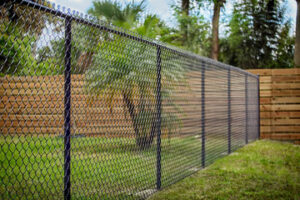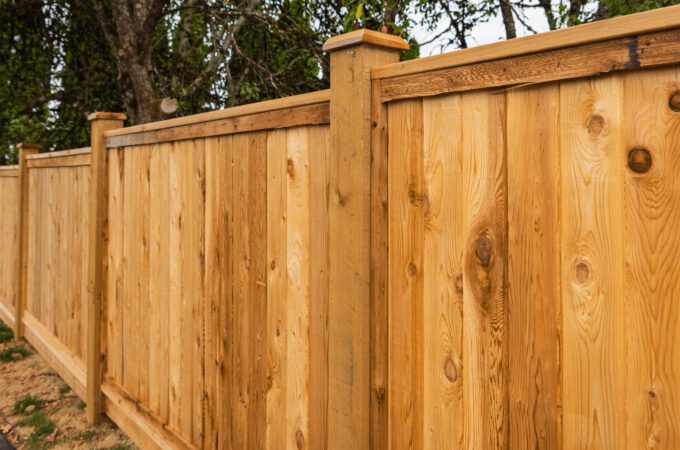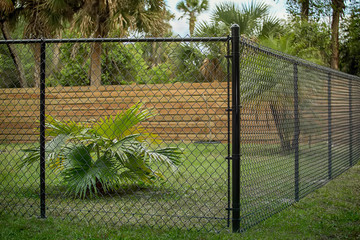The Benefits of a Chain Link Fence
Also known as “wire netting” or “cyclone fence,” chain link fence is made from galvanized or vinyl-coated steel wires that form a diamond pattern. This is an affordable option for homeowners looking to secure their yards.
Homeowners can control the cost of their Maisey Fence LLC by making choices about the gauge of wire and mesh size. Other factors include height and the number of gates.
Many homeowners choose chain-link fences to protect their homes and yards from burglars and intruders. They are also easy to maintain and offer a variety of options for customization. In addition, a chain-link fence can add an aesthetic element to the property and increase its value. These benefits make it an excellent choice for both commercial and residential purposes.
The most common type of chain link fencing is galvanized in a classic silver color, but there are powder-coated options available in a variety of hues. A galvanized chain link fence is more durable than traditional aluminum options, and it is resistant to rust and corrosion. This type of fence is ideal for enclosing commercial sites and properties with high security requirements, including the protection of HVAC equipment.
A chain-link fence is made up of a steel framework and mesh fabric. The framework is supported by posts that are buried in the ground and filled with concrete. The fence is hung from these posts, and the tension is created by the ends of each wire that are connected to each other by a series of ties.
Adding a barbed wire arm or strand to the top of the fence can deter unauthorized entry. This is a necessary safety feature for many sites, such as schools and hospitals. Other important features of a chain-link fence include its height and the size of the spaces in between the wires. A chain-link fence that is six feet tall or higher can keep out intruders and prevent them from reaching valuables. Choosing a low wire gauge can also make it more difficult to climb, as the lower the number, the thicker and harder the wire is.
In addition to these factors, the design and shape of a chain-link fence can make it more difficult for intruders to climb. This is especially true if the fence has a small mesh size, which can make it difficult for a foot to fit through. In addition, a specialized fitting called a boulevard band can be added to the end of each rail to prevent it from being removed.
Durability
A chain-link fence is one of the most durable fencing options. It can stand up to harsh weather conditions and other environmental factors that would quickly damage other types of fences. It is also resistant to rust and corrosion, making it a good choice for homes near bodies of water or other high-moisture areas. Proper maintenance and installation can also help extend the lifespan of a chain-link fence. Regular cleaning helps keep dirt and debris from building up, which can cause rust or corrosion. You can also trim vegetation regularly to keep it from scratching or damaging the fence.
Another way to prolong the lifespan of a chain-link fence is to apply a coating of rust-resistant paint or plastic coating to the surface. These protective coatings can last for up to five years, but they are more expensive than other fence finishes. However, they can save you the cost of having to replace a damaged or rotting section of your fence in the future.
If you want to add an element of privacy to your chain-link fence, consider using colored vinyl privacy slats. These are easily inserted into the mesh of the fence to provide additional security and privacy. They are available in a wide variety of colors to match the color scheme of your home or business, and they can be added at any time.
The durability of a chain link fence can be increased by choosing a lower wire gauge, which provides greater strength and quality. A lower gauge means that the wire is thicker and has more steel content. The size of the woven mesh also contributes to the fence’s durability. A larger mesh will be more visible, while a smaller one will be less noticeable.
Many homeowners and businesses prefer a chain-link fence because it is affordable, durable, and versatile. It is perfect for securing residential and commercial properties as well as enclosing play areas. It can also be used to deter wildlife from entering a property and keep people out of restricted areas.
Weather Resistant
Many homeowners choose to install chain link fences on their property due to the fact that they are more weather-resistant than other types of fencing. This is because the steel that makes up these fences has a special coating that keeps it from being damaged by wind and other elements. This type of fencing is also less likely to be damaged in a storm or vandal attack than other types of fencing, and it can be easily repaired by simply cutting out the affected area and reinstalling it.
Those looking for more secure options can get this type of fence made out of thicker fabric or add bottom rails and tension wire to make it even stronger. This will require an additional investment, but it will increase the security of your property and reduce maintenance needs as well.
The cost of a chain-link fence can vary depending on the size and shape of the enclosed area. Carefully measure the linear footage of the area you want to enclose, as this will be the basis for pricing. You’ll also need to calculate how tall you want your fence to be, as it comes in a variety of heights ranging from 3 feet to 12 feet. In general, taller fences are more expensive than shorter ones. Also, custom sizing (where two pieces of fence are spliced together to reach the desired height) will affect pricing as well.
These fences can be made out of galvanized metal that has been coated to protect the steel from corrosion and weather damage. They can also be covered in colored vinyl to improve their looks and provide additional protection against the elements.
A basic chain-link fence will cost around $5 to $15 per linear foot, depending on the height. This is the standard commercial fence, and it’s often topped with barbed wire for added security. It’s also an effective barrier to keep pets and children in or out of the yard.
Some chain-link fences are coated in PVC to protect them from corrosion caused by salt water or other chemicals. This is typically done in coastal areas where the fences may be subjected to flooding. This style of fence is often less expensive than the galvanized option, and it can be found in black or green.
Cost
The upfront cost of a chain-link fence is higher than some other fencing options, but it offers the potential for savings in long-term maintenance costs. Unlike wood or vinyl fences, chain link is durable and does not require painting or staining. It is also easy to clean and can be swept down to remove dirt or cobwebs. In addition, it is not susceptible to rot or insect damage.
The cost of a chain-link fence depends on several factors, including the size and height of the fence, the type of gate, and the materials used. The first step in determining the cost is to measure the area you wish to enclose. This will determine how much mesh and top rail you need to purchase. Then, choose a height based on your needs and local regulations. Finally, decide whether you want to add gates and how many. The gates themselves will increase the cost, and the type of hinges and latches used will also influence the price.
Another factor in the cost of a chain-link fence is its gauge, which refers to the number of wires twisted together. The smaller the diamonds, the more secure and expensive the fence will be. Finally, consider whether you want your fence to be galvanized. This will protect against rust buildup and extend the life of your fence.
While chain-link fences can be expensive, they offer a number of benefits that make them a wise choice for many homeowners. These fences are versatile and provide security for homes, schools, professional locations, and animal enclosures. Moreover, they can be easily set up and do not require any annual maintenance costs. However, it is important to note that if your fence is not properly galvanized, it will eventually develop rust and need to be replaced.
The most popular option for a residential chain-link fence is a galvanized steel finish, which provides protection against rust and corrosion. It is also available in a variety of sizes, making it a good choice for homes with limited backyard space. It is also possible to get powder-coated chain-link fences, which are protected against corrosion and are typically more attractive than bare metal fencing.


